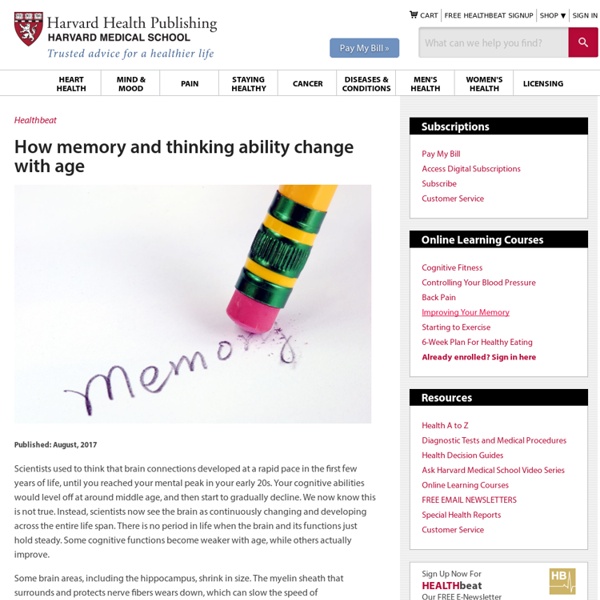Staying active through different ways!
There are many things you can do to help yourself age well: exercise and be physically active, make healthy food choices, and don’t smoke. But did you know that participating in activities you enjoy may also help support healthy aging? As people get older, they often find themselves spending more and more time at home alone. The isolation can lead to depression and is not good for your health. If you find yourself spending a lot of time alone, try adding a volunteer or social activity to your routine.
What is Normal Cognitive Aging?
iStock.com/PeopleImages Everyone experiences a “senior moment” as they get older. Episodes of misplacing keys or forgetting an acquaintance’s last name doesn’t necessarily signal a brain disease. We asked Denise Park, director of research at the Center for Vital Longevity and chair in Behavioral and Brain Sciences at the University of Texas at Dallas, what happens to the brain and cognition as we simply get older and what we can do to mitigate the effects of it. How does the brain change as it ages? The brain shrinks, or loses volume, with age, primarily in the frontoparietal and hippocampal regions.
Attention Deficit Can Come with Old Age
Source: Are you old enough that this sounds familiar? Actually, memory problems like these affect most people at some time, but getting older can make such forgetting worse.
Age is only a Number - Move it, Feel young
Exercise does not need to be boring! Reap the benefits by doing a variety of exercises that will get your heart pumping. <div class="ExternalClassE124997C6FC942E79070FD4A514E304B"><h1>Age is only a Number - Move It, Feel Young!</h1><p>Did you know that regular exercise not only boosts your health but also your mood? Being 21 again need not be a distant memory if you can feel like it. Engaging in regular exercises can do just that!
Cognitive Skills and the Aging Brain: What to Expect
Every day we perform hundreds of cognitive tasks but are mostly unaware of the effort involved. These tasks take different forms, such as noticing colors, remembering names, or calculating time on a watch. Measures of brain function using functional magnetic resonance imaging (fMRI) show that the most active areas of the brain vary according to the task being performed. The data confirm what researchers have known for many years: that our mental functions are composed of many distinct types of cognitive abilities. Mental abilities change throughout life, first as a result of brain maturation and later with aging of brain cells and their billions of complex interconnections. As people age, their movements and reflexes slow and their hearing and vision weaken.
Cognitive Health and Older Adults
Cognitive health—the ability to clearly think, learn, and remember—is an important component of brain health. Others include: Motor function—how well you make and control movements Emotional function—how well you interpret and respond to emotions Sensory function—how well you feel and respond to sensations of touch, including pressure, pain, and temperature This guide focuses on cognitive health and what you can do to help maintain it. The following steps can help you function every day and stay independent—and they have been linked to cognitive health, too.
What are Cognitive Skills and Abilities?
By: Dr. Pascale Michelon What is cognition? Cognition has to do with how a person understands the world and acts in it.
What Is Mild Cognitive Impairment?
Some people with memory problems have a condition called mild cognitive impairment, or MCI. MCI has several types. The type most associated with memory loss is called amnestic MCI. What Are the Symptoms of MCI? People with amnestic MCI have more memory problems than normal for people their age, but their symptoms are not as severe as those of people with Alzheimer's disease. For example, they do not experience the personality changes or other problems that are characteristic of Alzheimer's.
See, Hear & Eat Better
Head down to a functional screening session in your neighbourhood to get your eyes, ears and mouth checked! Get fitted for assistive devices such as spectacles, hearing aids and dentures if needed, and at an affordable cost. Here’s the schedule Receive your results on the spot. Receive a referral for follow-up, if needed.
Aging & Cognitive Function
How does aging affect memory and cognition (thinking)? Almost all of us become aware of changes in memory and cognition (thinking) as we get older. We begin to have difficulty recalling names of people and places, notice that our mental processing has slowed, and that learning is more difficult. We find that certain functions (for example, eye-hand coordination) are also slower.
6 Best Cognitive Games and Activities for Seniors
Has a senior loved one struggled to recall the name of an old friend or remember the street that their first house was located on? Little facts like these can be a challenge for seniors to remember as they get older. If someone you love faces memory challenges, don’t worry. There are steps they can take to keep their minds active and improve memory functions.




The web page discusses a few topics: - how the brain components and functions contributes to weaker cognitive abilities - how age is related to certain diseases that compromises cognitive abilities - a brief guide to identify normal and serious cognitive loss by klpeh005 Mar 28